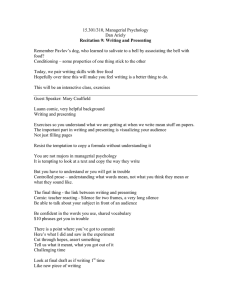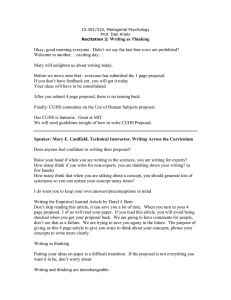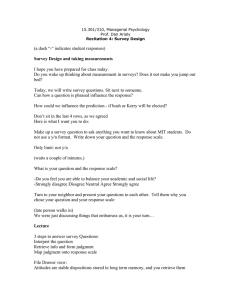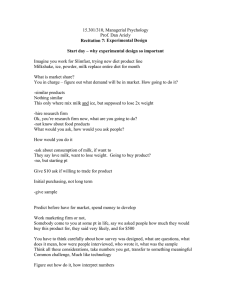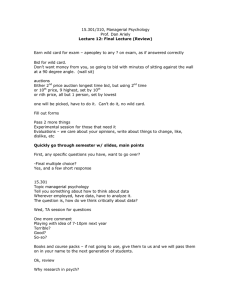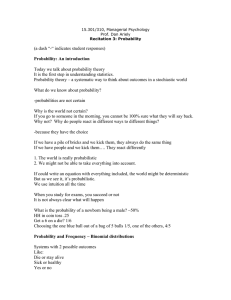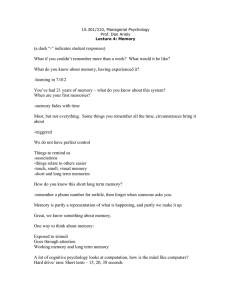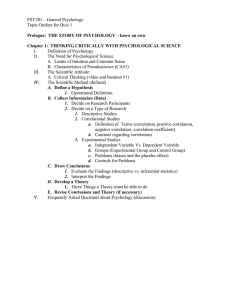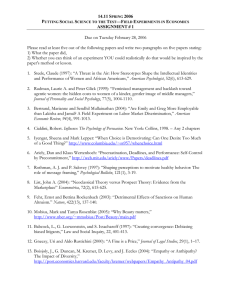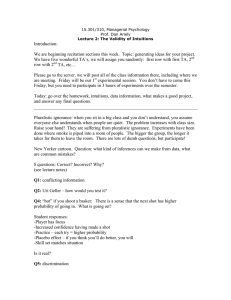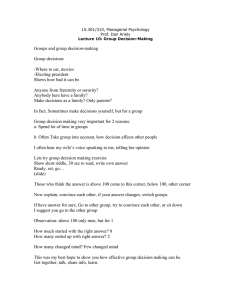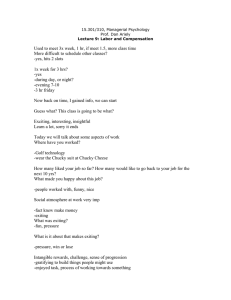Document 13626337
advertisement
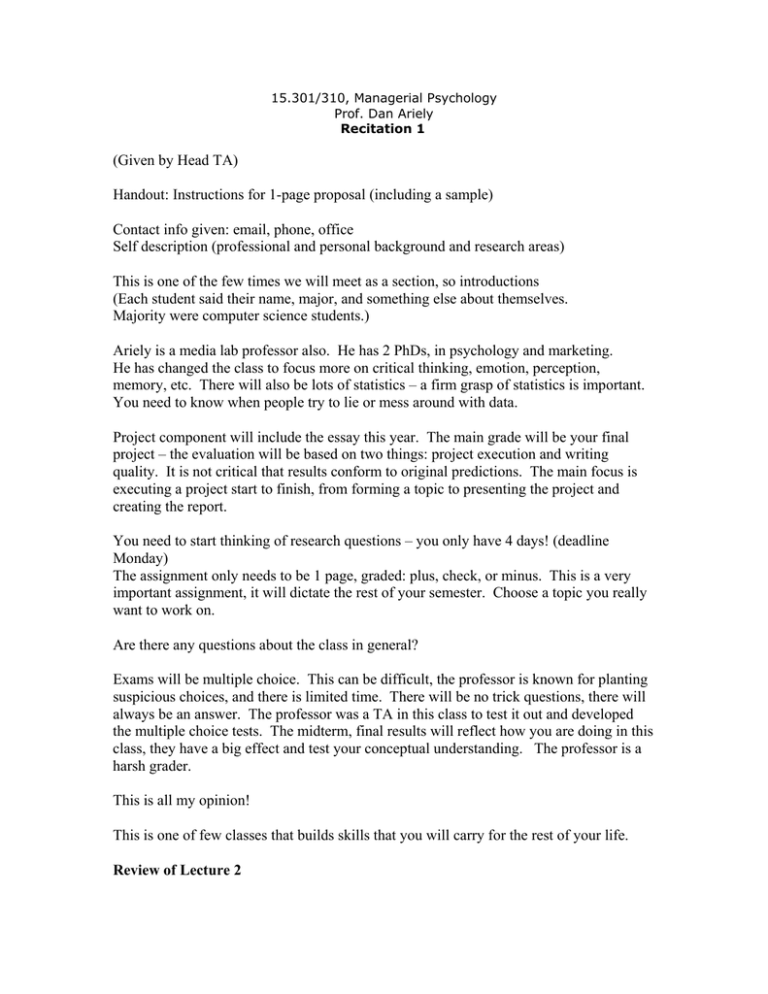
15.301/310, Managerial Psychology Prof. Dan Ariely Recitation 1 (Given by Head TA) Handout: Instructions for 1-page proposal (including a sample) Contact info given: email, phone, office Self description (professional and personal background and research areas) This is one of the few times we will meet as a section, so introductions (Each student said their name, major, and something else about themselves. Majority were computer science students.) Ariely is a media lab professor also. He has 2 PhDs, in psychology and marketing. He has changed the class to focus more on critical thinking, emotion, perception, memory, etc. There will also be lots of statistics – a firm grasp of statistics is important. You need to know when people try to lie or mess around with data. Project component will include the essay this year. The main grade will be your final project – the evaluation will be based on two things: project execution and writing quality. It is not critical that results conform to original predictions. The main focus is executing a project start to finish, from forming a topic to presenting the project and creating the report. You need to start thinking of research questions – you only have 4 days! (deadline Monday) The assignment only needs to be 1 page, graded: plus, check, or minus. This is a very important assignment, it will dictate the rest of your semester. Choose a topic you really want to work on. Are there any questions about the class in general? Exams will be multiple choice. This can be difficult, the professor is known for planting suspicious choices, and there is limited time. There will be no trick questions, there will always be an answer. The professor was a TA in this class to test it out and developed the multiple choice tests. The midterm, final results will reflect how you are doing in this class, they have a big effect and test your conceptual understanding. The professor is a harsh grader. This is all my opinion! This is one of few classes that builds skills that you will carry for the rest of your life. Review of Lecture 2 Causality and Correlation: Their relationship is often misinterpreted. Causality -> Correlation Causality implies correlation, but not the other way around. Causality: X (independent variable) -> Y (dependent variable) Correlation: X<->Y E->X->Y E is the moderator. X effects Y, but only under certain circumstances. Example: Does music have an effect on how people do on an exam? E might be the type of music played. One type might have an effect, and another might not. Basic Criticisms Y->X Reverse Causality. It is actually Y that is causing X. For example: you might say making lots of money (X) causes a person to be happier (Y). But maybe the reverse is the correct relationship, maybe if you are happy you end up making more money. X Ù Y Double causality (endogenity) It is the same thing as correlation, but broken down into parts. X->E->Y E here is the mediator. Taking our Money -> Happy example, perhaps it is really money (X) -> possessions (E) -> Happiness (Y) X <- E -> Y Spurious relationship (no causation!) Maybe it is having a goal in life (E) that makes people earn money (X) and also makes people happier (Y) Questions: mediator v. moderator? Mediator sits between the independent and dependent variables. Music -> Concentration -> Better exam score Moderator determines when a relationship holds Type of music? M/F? (E) -> Music played (X) -> better scores (Y)? Think about the relationship, try to tear it apart. Your project proposal is due Monday. 15.301/310, Managerial Psychology Prof. Dan Ariely Recitation 1 Page 2 of 5 We need to talk one on one about your project before you submit your proposal, you can set up an appointment with me or send me an email for comment since there are only 4 days until it is due. Methods to think of Research Questions I sat down with the professor for ice cream and he asked me: What is your passion in life? What are you most excited about? For example, one student was really interested in exercise and its effect on people. That lead to conversation about weight loss and that lead to how people respond when they are asked about their weight, weight changes over the past year. The hypothesis: it depends on your gender. Anchoring In a survey, people are asked first, the last 3 digits of their Social Security number. Then they are asked if they think the number of African nations in the UN is bigger or smaller than that number. Last, they are asked how many African nations they think are in the UN. It was found that, for females, their last answer was highly correlated with the anchor (SS # digits) • What is the most bazaar behavior you have witnessed or heard about in the last week? • Procrastination is assumed to be bad, but could it be good? Reverse an assumption, list reasons it could be that way, turn one into X • Take a basic relationship you know and push it to an extreme. Smoking is considered bad for your health. Think of external, moderating variables. • Look at cartoons – Why is it funny? Why is it not funny? • Think about your dreams – they may uncover you basic interests • Look at notes you have taken in other classes. In which sections did you take the most notes? It may indicate an interest. • Talk to friends. Spend 5-10 minutes thinking of ideas with somebody sitting next to you. In the group, choose and share with the class your favorite idea: • minority education in science and technology – why do fewer minorities choose to go into Science and Engineering? Does it depend on if they went to a private or a public school? Can we look at their success at MIT? Did they attend summer programs? TA: Can you frame your research question into one sentence? 15.301/310, Managerial Psychology Prof. Dan Ariely Recitation 1 Page 3 of 5 What effects minority choice to go into science and technology education? (not chosen a focus yet) TA: What drives the choice of major? Perceived beliefs of training received? Public school students not feel they are as strong academically? Peers? How do peers affect the choice? Objective measures v. Subjective measures (self response) Peers affect perceived knowledge This topic may require a longitudinal experiment Important to public policy. Compare belief systems between minorities, non-minorities? • Effects of free food on College Students. Possible experiment – email a dorm about free food and see who comes TA: Controls – age? Living situation? Time available? Exam period v. beginning of semester? Many variables involved. Think about the psychology involved. What is the difference, cheap food v. free food? It is important to design a clean experiment. • MIT-Africa program. Friends reacted in a variety of ways. What effects people’s reactions and feelings toward the program? Does it depend on their gender? If they have traveled? MIT- Africa v. India or Japan? Why is their reaction different? TA: Make your question more specific. Think about some responses that you have had. What is driving them? Preconceived beliefs? Classes? Concerns? Long-term career effects? • Emotional social behavior when two people dance close at parties. To what extent does dancing close effect sexual arousal? Is it the activity? Or mutual participation? Is there a time factor? Lighting? Standing close? Gender? Conversation? What happens if you assign partners v. picking your own? Social desirability -> sometimes people will answer how they think they are supposed to answer. Use their own response as an anchor – “how many people do you think would…” • Free food v. free money Money will make something a transaction 15.301/310, Managerial Psychology Prof. Dan Ariely Recitation 1 Page 4 of 5 Food is more like a favor There have been studies on this, I can refer you to papers to read. • Do you admire someone more if they are good at something you know about or something you don’t know about? TA: I am doing some similar research on envy. It involves a self concept and if the factors involved are relevant to your self concept. Closeness is important, such as if the person is a peer. Envy is a perceived relationship. There is not enough time to discuss all these ideas now, but I will email examples to you from past semesters. Email me so that we can discuss your ideas. 15.301/310, Managerial Psychology Prof. Dan Ariely Recitation 1 Page 5 of 5
